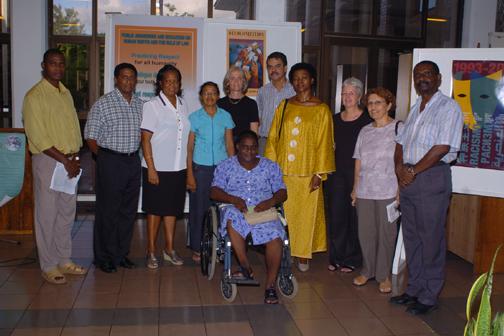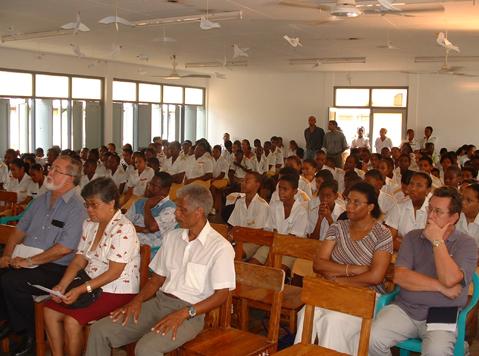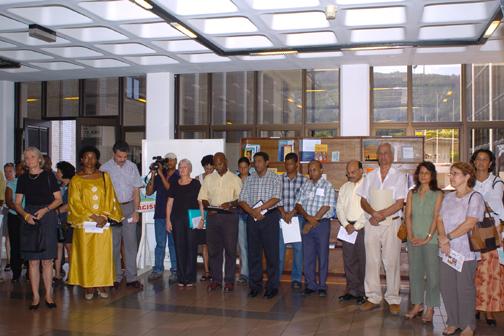| Posted: May 01 2005,16:24 |
If you wrote this report, you will find a button here that you may click
in order to make changes in the report. 
|
PROGRESS: Has your organization seen
progress toward a culture of peace and nonviolence in your domain of
action and in your constituency during the first half of the Decade? |
During
the period 2001-2005, the Centre for Rights & Development (CEFRAD)
has been the leading NGO in the process of transforming the
International Peace & Solidarity Project (IPSP, a Seychelles civil
society peace network) into the Small Islands Peace Action Initiative
(SIPAI). Both IPSP and SIPAI have attempted to propagate the view that
arts and culture can be appropriate vehicle for the promotion of a
culture of peace and non-violence, with SIPAI laying emphasis on
"turning peace echoes into peace actions".
SIPAI was formally
launched at the national level (Seychelles) on 22nd September 2003 to
commemorate UN International Day of Peace. Venue for the event was one
of the country’s largest secondary schools situated on the outskirts of
the capital. Other schools on the main island have since manifested
great interest in becoming part of the Initiative. A first plan of
action adopted during 2004 has already attracted participation from
schools, civil society organisations and public institutions. During
2005 indicators are being developed to measure future progress.
|
OBSTACLES: What are the most important obstacles that have prevented progress?
|
Although
it has been proved not to be a reality, there is still a widely-held
belief that small island developing countries are sheltered from
violence and social unrest. A general lack of motivation still
prevails, especially with people in positions of authority and
leadership, where it concerns preventive measures, such as serious
peace reflections and peace education. Organisations and institutions
participating in SIPAI have taken the task to set the lead in
pro-activeness in favour of conflict prevention.
|
ACTIONS: What actions have been
undertaken by your organization to promote a culture of peace and
nonviolence during the first half of the Decade?
|
During
the period under review CEFRAD has been the legal host orgainsation for
SIPAI. Please find attached a SIPAI progress report and local action
plan. The Initiative was launched at the regional level at a Small
islands workshop on ‘Democratic Governance for Sustainable
Development’which took place in Seychelles in January 2004, and at the
inter-regional/international level during the UN SIDS conference in
Mauritius, January 2005.
On 8th April, 2005 CEFRAD in
collaboration with eight other civil society organisations, launched a
public awareness and education campaign on human rights and the rule of
law. The official launching - involving participation also from
Seychelles Government and the private sector - took place under the
theme: ‘Practicing Respect for all Humanity’, by way of a Citizenship
Week with a Human Rights & Peace Exhibition from 8th to 13th April
2005. Other activities under the same campaign include a human rights
& peace survey (May to October 2005) and a series of public
seminars (May 2005 to April 2006) on a number of issues having impact
on the daily lives of citizens. And one of the major objectives of the
said campaign is to provide a platform for public views on, and
inputs into what could constitute an effective, comprehensive national
strategy for democracy, good governance, human rights, peace education
and sensitisation.
CEFRAD photos:

Cefrad1
- Launching of first Citizenship Week in Seychelles, on Friday 8th
April 2005, under theme: 'Practicing Respect for all Humanity',
officated by Seychelles Minister of Education & Youth (Danny Faure)
in the presence of UNDP and OHCHR representatives.

Cefrad2 - part of the audience at the Citizenship Week launching exhibition on Human Rights & Peace

Cefrad3
- Launching of SIPAI Seychelles on 22nd September 2003 at the Plaisance
Secondary School, officated by Sir James R. Mancham, former (first)
president of Seychelles.
|
ADVICE: What advice would you like to
give to the Secretary-General and the General Assembly to promote a
culture of peace and nonviolence during the second half of the Decade? |
Need
for promoting greater respect for human dignity (starting with
self-respect) within families, in schools and other learning
establishments, in communities, at the workplace and in business.
|
PARTNERSHIPS: What partnerships and
networks does your organization participate in, thus strengthening the
global movement for a culture of peace? |
SIPAI (regional and inter-regional)
COMESA Peace & Security Programme
World Peace Form 2006 (Vancouver, Canada)
|
PLANS: What new engagements are
planned by your organization to promote a culture of peace and
nonviolence in the second half of the Decade (2005-2010)? |
(i) More serious reflections on threats to peace and security;
(ii)
Human rights education for promoting a culture of peace and
non-violence, to be undertaken at community level and in learning and
training establishments;
(iii) Indian Ocean Peace retreat proposed for January 2006;
(iv) Regional and international peace exchanges.
|
Postal address of organization
|
|
E-mail address of organization
|
cefrad@seychelles.sc
|
Website address of organization
|
|
Highest priority action domain of a culture of peace
|
Education for a culture of peace
|
Second priority action domain of a culture of peace
|
Human Rights
|
Highest priority country of action (or international)
|
National: Seychelles and the Chagos Archipelago
Regional: South Western Indian Ocean region
International: small islands regions of Caribbean, Indian Ocean and Pacific Ocean
|
Second priority country of action (or international)
|
|
| Back to top |
|



